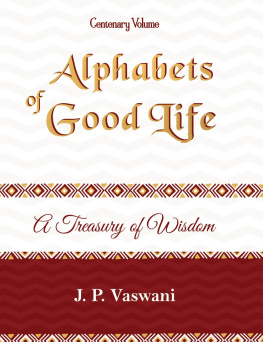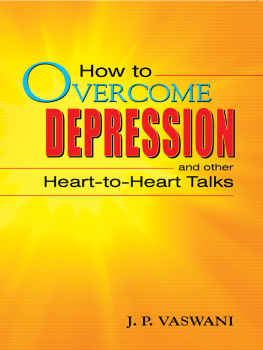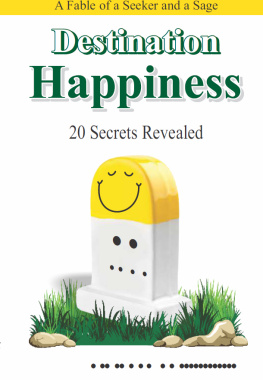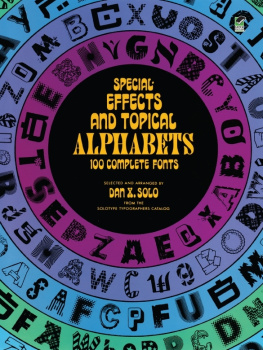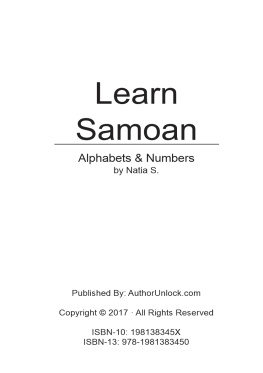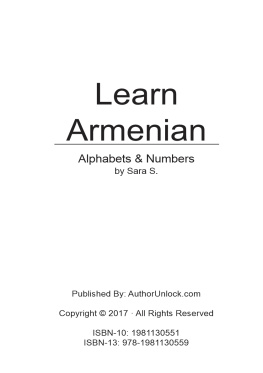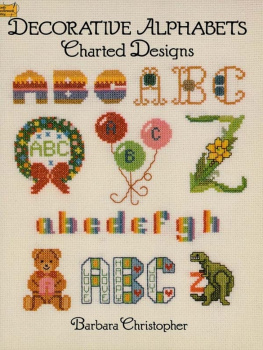Published by
Gita Publishing House
Sadhu Vaswani Mission,
10, Sadhu Vaswani Path, Pune - 411 001, (India).
J.P. Vaswani
First Published - 3000 copies - August, 2018
eBook edition November, 2018
ALPHABETS OF GOOD LIFE
ISBN 978-93-86004-25-3
No part of this book may be reproduced or utilised in any form or by any means, electronic or mechanical including photocopying, recording or by any information storage and retrieval system, without permission in writing from the Author.
Printed at Thomson Press (I) Limited
A LPHABETS OF G OOD L IFE
J. P. VASWANI
Edited by:
Dr. (Mrs.) Prabha Sampath
&
Krishna Kumari

GITA PUBLISHING HOUSE
PUNE, (INDIA).
www.dadavaswanisbooks.org
Compilers Note
When we decided to bring out a collection of one hundred aspects of Dadas teachings in connection with the much looked forward-to Centenary Celebrations, we stood baulked at the very outset by the difficulty in choosing! We brainstormed and pooled ideas over what topics we could choose, and found ourselves simply overwhelmed by everybodys insistence on their favourite topics. If we were to do justice to readers choice, we would have to compile a list of not one hundred, but one thousand topics and aspects of Dadas teachings!
And the trouble is that Dada would be the first to deny that he is a teacher or a guru and that he teaches anything to anyone.
In a sense, this is true. Dadas life is his greatest message, the best book that can motivate and inspire you! But he has spoken to us, written for us, and thousands of us treasure and value his teachings for the comfort, solace, support and inspiration they have brought into our lives!
Described as a 21st century mystic who walks in the footsteps of the great Masters who come to this earth to teach and transform, Dadas words have reached and touched people from all walks of life, all over the world. He is the author of over 150 books; and as a writer, there are few subjects of human interest which he has left untouched; from karma to liberation, from simplicity to prosperity, from compassion to management, from friendship to parenting, from marriage to education, Dadas inimitable wisdom and humour has illumined every topic he deals with!
The gift of writing came to Dada very early on in life. Even as a college student, Dada edited no less than three monthly journals- the Excelsior, the India Digest and the East and West Series, all of them widely circulated and appreciated by his readers. Dadas writing is lucid, inspired, and free-flowing, much like his oratory. A unique feature of his books is that they are not the kind you read once and put away. Instead they are read and re-read to draw inspiration and spiritual strength. They are an inexhaustible source of wisdom and faith for countless readers. As for his mantras for the modern man, thousands of his chosen sayings are echoed across the globe by people seeking hope and faith: I am not alone, God is with me! Not my will, but Thy will be done! Let go, let go, let God! Thank you God! I accept! Qabool, qabool, qabool! Yes Father, yes, and always yes!
We cannot tell how many times people have repeated these words to themselves, how many times they have returned to Dadas books to rekindle their faith and find the courage to carry on!
We thought therefore, that we would compile one hundred aspects of Dadas wise and loving messages to us all, one hundred chosen life-lessons that would inspire us to live the kind of life that we ought to live. They are in Dadas own words, as he spoke them, wrote them, or gave them as answers to queries placed before him.
We have only scooped a handful of nectar from an ocean of Dadas wisdom!
Anger- Burn It!
A nger is a wildfire, a forest fire which spreads from shrub to shrub, from tree to tree, consuming everything that comes its way. In Hindi, we have a couplet which says: Anger is the great inflictor of sorrow, the great sinner. First, it sets on fire its own mind, then the fire spreads to others. Anger creates a chain reaction. Someone gets mad at me- I must take it out on someone else, otherwise it will keep on seething within me. That someone else must have it out on yet someone else. And the chain reaction goes on!
Anger is so endemic today, wildly prevalent and inherent to our century that we could call it the age of anger.
On the surface, we all are good and virtuous. But, within each one of us, there lie hidden so many weaknesses and imperfections, the worst elements within us, which are at times made manifest. Therefore, we must burn anger before anger burns us!
How many of us can truthfully say that we are masters of our anger? A little thing happens and we feel upset or irritated. A person speaks rudely to us and the colour of our countenance changes. We suffer losses in business, and our sleep is disturbed. Suddenly a dear one is snatched away from us and we lose our faith in God. This is the sad condition of so many of us.
Anger is more destructive than fire, more disastrous than an earthquake. In anger, individuals fight each other, leading to dire consequences. In anger, nations fight each other and thousands of young, precious, promising lives are lost.
But the good news is: anger can be controlled!
Why do people get angry?
The simple cause of anger, I believe, is self-will. Whenever I want something to be done in a particular way and it is done differently, I get angry. If only I can curb my self-will by surrendering it to the Will Divine, I will not be angry. Once I realise that everything that happens, happens according to the Will of God, and in the Will of God is my highest good, I shall never, never, get angry.
If only we realised that whatever happens, happens according to the Divine Will, we would never succumb to anger.
Can anger ever be justified?
Anger is a two-edged sword. There is a type of anger which drains energy and produces tension. There is another type that is a positive and creative life force, known as righteous anger. When it is my duty to be angry, and I become angry- that is righteous anger. A parent sometimes has to be angry with the child for the good of the child. A teacher sometimes has to be angry with a student for the good of the student. An employer sometimes has to be angry with an employee for the good of the organisation.
If you find a man molesting a woman, or ill treating an animal on the roadside, you have every right to be angry. Anger becomes righteous when you get angry to defend the rights of another, without any selfish motive. When a person feels it is his duty to get angry, he dissociates himself from his self-will. He himself becomes a spectator to his own anger. The historical example of righteous anger is given us in the New Testament. Jesus visits a temple and finds the priests desecrating it. He gets righteously angry and says to the priests, What is it that you are doing? You have converted my Fathers home into a commercial house.
This type of anger- righteous anger- will not degrade a man but will ennoble him.
What is the difference between suppression and control of anger?
There are three ways of handling anger. There is the way of expression, which so many of us follow. We feel angry and release it through our words and actions. Expression gives us relief, for we get some satisfaction at having given a piece of our mind to the person who upset us. This relief, however, is temporary. Resentments build up again, and we are ready for another spill out. Gradually, anger becomes a habit and the time comes when webecome slaves to anger. We are controlled by anger, and anger is a terrible master. I read about a mother who, in a mood of anger, threw her own child into the fire!

